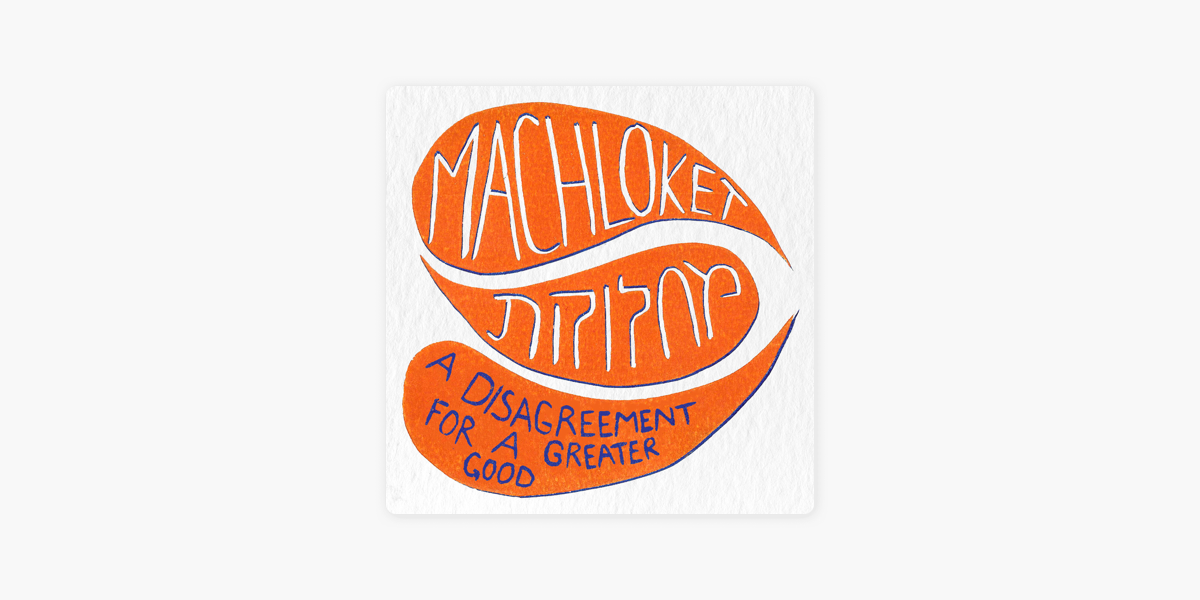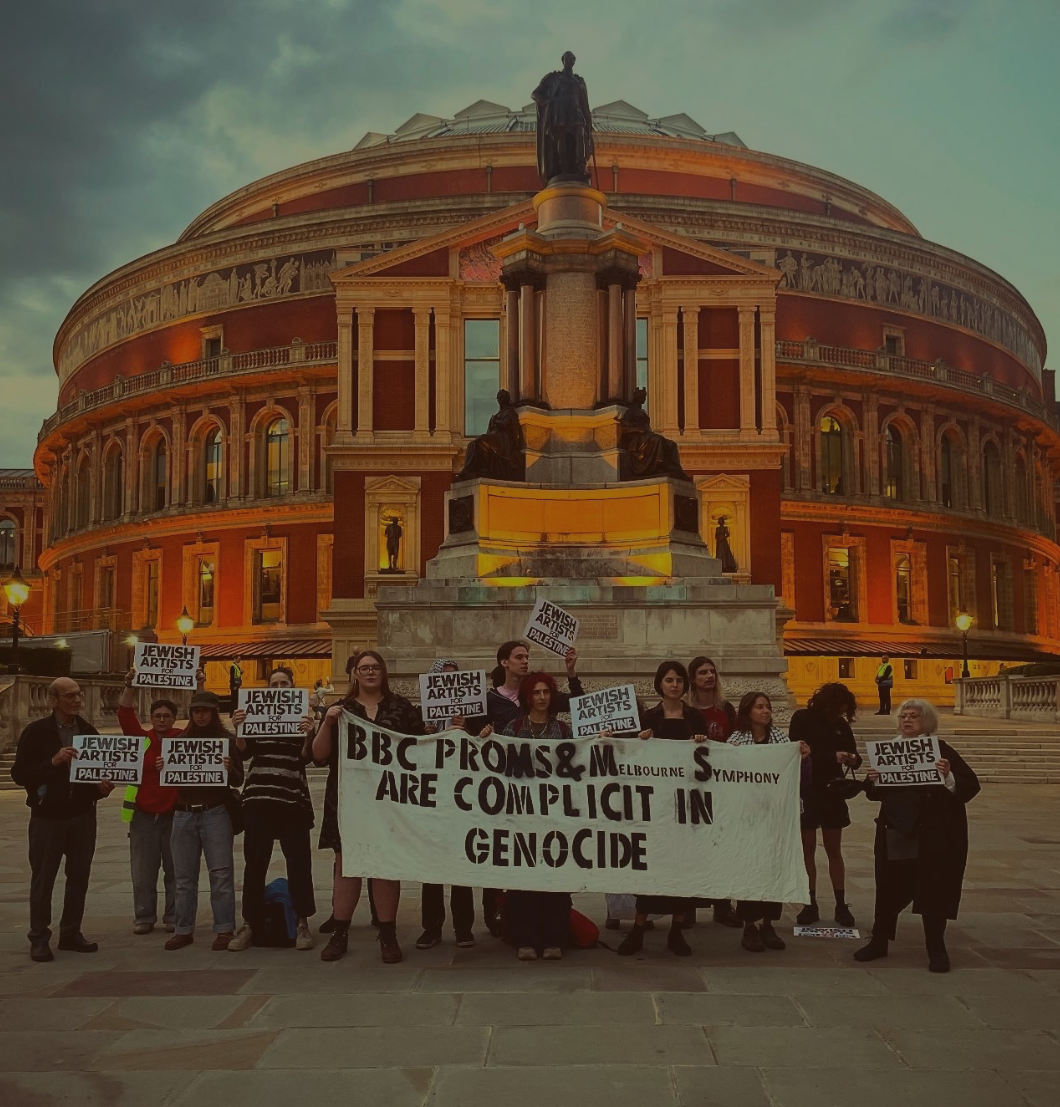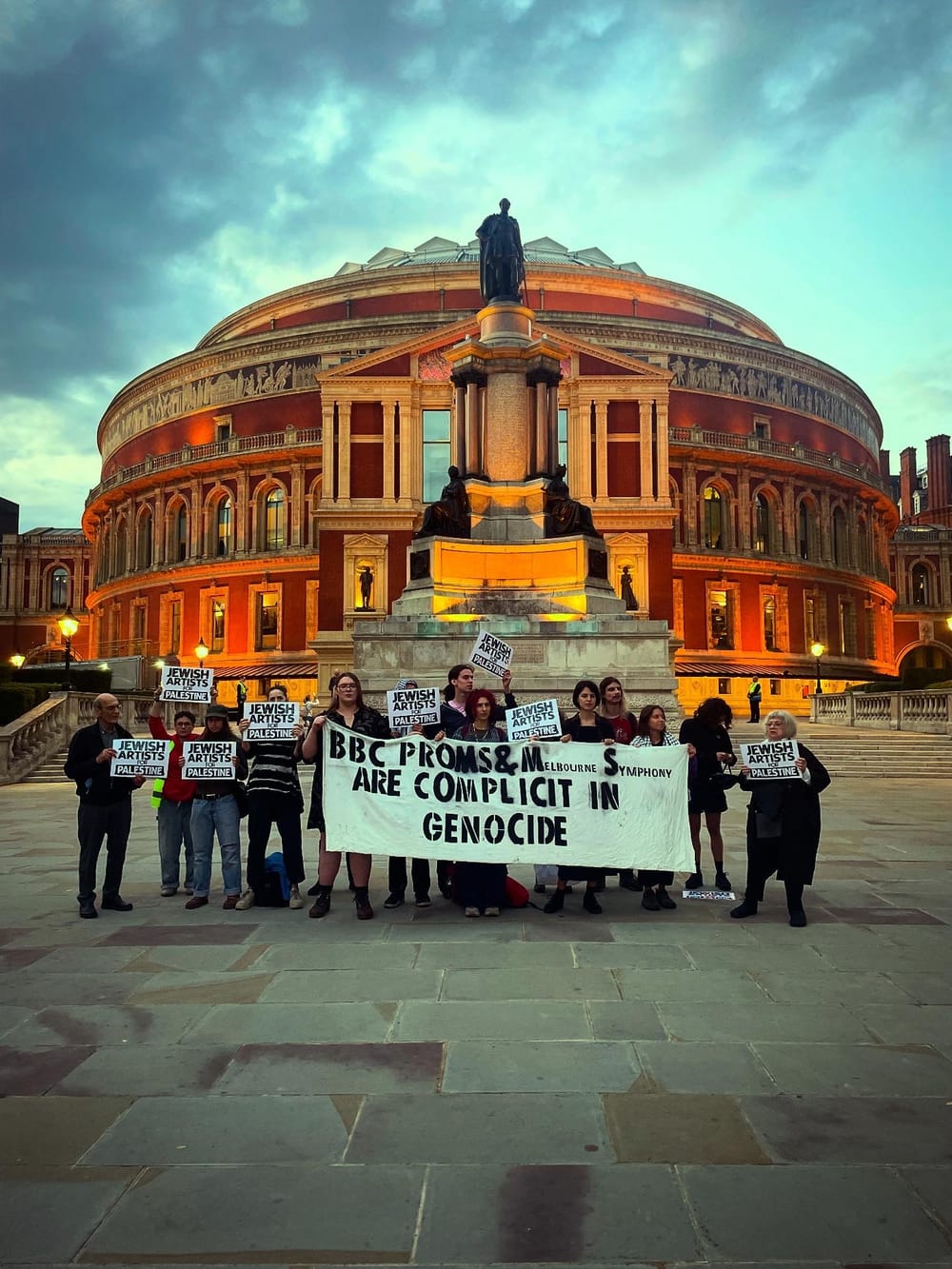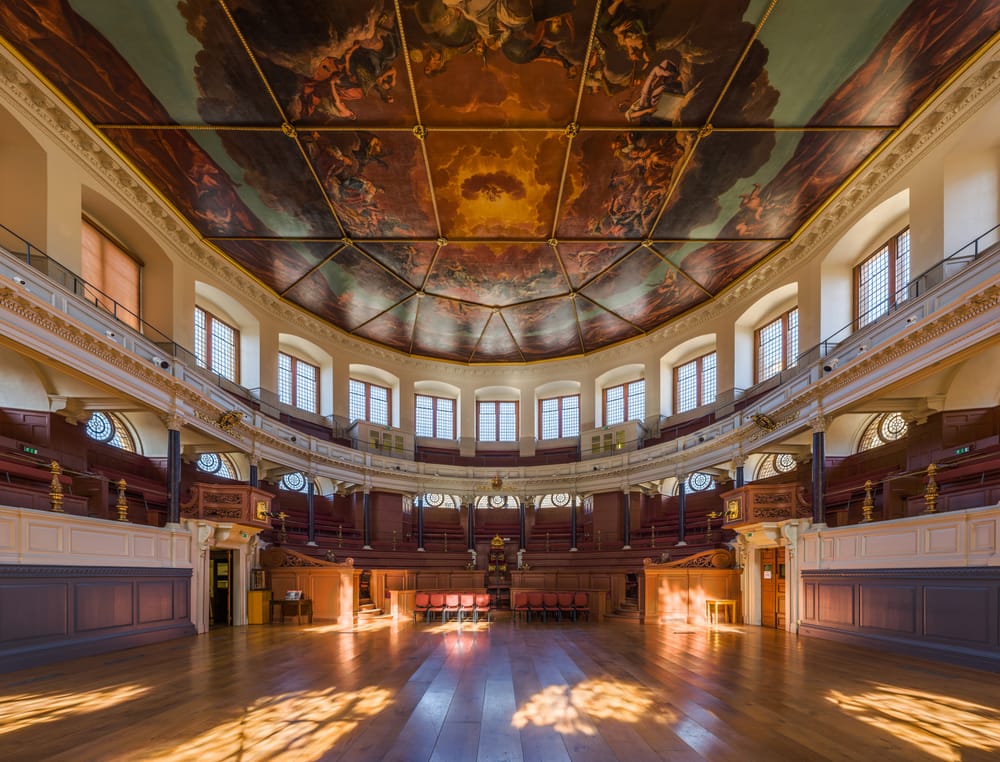Disagreeing for the greater good
Vashti speaks to the hosts of a new podcast exploring what British Jews really think.

On Sunday, several thousand people marched against antisemitism in Manchester, in a rally organised by the Jewish Representative Council of Greater Manchester and Region. The marchers waved Union Jacks, Israeli flags, and signs declaring “Zero tolerance for Jew hatred.”
Using the occasion to commend the government’s support for British Jews, Board of Deputies President Marie van der Zyl declared that since October 7, “the strength of the British Jewish community has been shown”.
Despite this apparent show of unity, activists with Na’amod and Jewish Action for Palestine Manchester claimed on social media that organisers, including the Community Security Trust (CST), had barred them from the main march due to their banners. The CST initially denied this, but a video later surfaced where a police officer informed the marchers: “The CST and the organisers are adamant they don’t want these banners in there.”
While the dispute seems minor in comparison to the war in Gaza and the resulting polarisation in the UK, it raises a significant question: who is considered welcome in the fight against antisemitism? Or in other words, what gives some Jews legitimacy within the Jewish community and the authority to speak on its behalf?
Launching in February, a brand new podcast tries to unpack this question. Machloket – which roughly translates as “disagreement for a greater good” – is not just a podcast, it’s a community storytelling project which seeks to explore, share and celebrate what life is like for all sorts of Jewish people in the UK. Over the past year, producers Nick Cassenbaum and Tash Hyman have been travelling up and down the country – from Truro to Bradford – inviting community groups to participate in refreshingly raw, funny, and productive conversations. I sat down with them to find out if they learned anything.
Tell me about yourselves and the origin of this project.
Nick Cassenbaum: I’m a playwright, theatre maker, and community arts facilitator. I started out as a street performer and transitioned to creating indoor productions. My focus is always on storytelling and connecting with people.
I grew up in Essex within a liberal synagogue setting, and the close-knit community atmosphere felt to me like a shtetl. It felt like a place where everyone knew each other, like the old East End transferred but in smarter outfits. I’m really interested in diasporism as a response to the homogenisation of Jewish identity, and the concept of doikayt, or hereness.
Tash Hyman: As a theatre director, the thing that really drives me is creating new work – whether that’s plays or collaborative projects. I’ve spent a lot of time developing programs and facilitating workshops to empower young artists, professional and non-professional.
Nick and I met in 2019 at a retreat for Jewish theatre artists. At that point, I wasn’t really thinking about the intersection of my Jewish identity and my work. I hadn’t been actively contemplating my Jewishness much at all. I had a reform Jewish upbringing, I was in a Jewish youth movement, but I gradually disengaged from my Judaism during my teenage years. From my early 20s onwards, my Jewishness took a back seat. But this retreat in 2019 was a turning point in terms of opening my eyes to how my Jewishness feeds into my work.
After the retreat, Nick and I began developing workshops for arts organisations, providing training on understanding antisemitism and Jewish representation. We felt a sense of frustration with the ongoing conversations about these topics, especially how they were being weaponised and how the narrative was evolving, especially in the media. We were seeing a kind of narrowing in the representation of what Jewishness means.
Nick: That narrowing includes many intersectional Jewish identities that are underrepresented. For instance, David Baddiel’s account of Jewish identity in his book Jews Don’t Count seems to totally erase the presence of Jews of colour.
Tash: There was a show at the Royal Court called “Jews. In Their Own Words”, which sort of underscored how the portrayal of Jewish experience in the UK is too often limited to white middle-class, middle-aged men or women from north-west London. It didn’t resonate with our experiences or those of people we know. As storytellers and community artists, we felt we could and should do something about it. We wanted to make a project for Jewish audiences to feel represented and seen, but also for non-Jewish audiences to understand and know about the richness of Jewish identity and narratives.
Nick: I’ve worked with the Royal Court and I run a community-focused theatre company called Take Stock Exchange. We brainstormed a project to connect with various Jewish community groups across the UK, interpreting “community” broadly to mean friends, care homes, synagogues, even golf clubs, as long as their commonality was being Jewish. The goal was to meet these groups, share stories, and learn about each other. We wanted to initiate conversations to create what we call “dialogue through difference”.
Tash: We asked each group: What does Jewishness mean to you, and what does this group mean to you? It became a reflective experience – we stepped into other people’s spaces, meeting them where and how they normally gather. We aimed to capture a snapshot of their existence by letting them articulate the importance of their community and Jewishness.
You both have backgrounds in theatre – what was the transition into podcasting like?
Nick: With theatre, I’ve always taken for granted the communal moments with the audience: the shared understanding, the presence of our bodies in the storytelling space. In that sense, the podcast posed a challenge in terms of thinking about how we could create those moments of community without the physical presence. We tried to do this by openly discussing how the workshops were affecting us on the podcast and by thinking about what the listener’s relationship is with us, taking into account the conversational nature of this medium. There are certain interesting things which a podcast enabled us to do, which a live show would not. For example, through featuring the voices of real people we had met, we could let people tell their own stories in their words, and give listeners a more authentic insight into those communities.
Can you provide a snapshot of some of the groups you visited?
Nick: We visited a golf club near Manchester; a revitalised rural Jewish community in Cornwall; an LGBTQ+ Talmud study group; a Jewish school in North London; a community of ex-Egyptian refugees; and a group of people who didn’t feel they were Jewish enough, among others. There were a number of other groups we visited, who didn’t feature on the podcast. For example, a synagogue in Bradford – the only one in the UK with a Muslim on its board. We had a very emotional, expansive conversation with black British Jews, which reminded us of the importance of representation. We witnessed a very special encounter between a father and son from the Indian B’nai Israel community – seeing the son learn about his father’s experiences growing up in the East End, navigating a predominantly Ashkenazi environment. We had another great workshop in East London at a day centre for older people, capturing the last generation of a unique Jewish life in East London. Then there was the group who described themselves as feeling “not Jewish enough” who came together in response to a call out we made on Twitter.
In the second episode you visit a secondary school in North London, and the conversation turned heavily towards their relationships to Israel. Did you plan to explore themes of Zionism and Israel in Jewish education?
Nick: We went into that workshop with the same set of questions as every other: What does Jewishness mean to you? And what does this community mean to you? The intent was not necessarily to talk about Israel and education, but interestingly, their responses often circled back to these themes. It’s possible that it had something to do with it recently being Yom Ha’atzmaut (Israeli Independence Day) and Yom Hazikaron (Israeli Memorial Day). And this evolved into a conversation about security – with the level of security you see at the school gate, it’s something that they are regularly reminded of.
Do you think the workshops would have gone differently had you conducted them after the 7 October attacks?
Tash: Yeah, I think the workshops would have gone very differently. Had we conducted the workshops now, I don’t think there would have been enough space for many of the groups to reflect on their Jewishness independently without it being clouded by the events of 7 October. Jewish communities have become so polarised and emotionally charged since 7 October, that I think it would have made holding these conversations more challenging. Our timing was important in that it allowed us to capture a snapshot of Jewish life in Britain before all these heightened tensions.
Nick: I see this moment as an unprecedented rupture within Jewish communities – families falling out, people leaving shuls, or being told they’re the wrong type or right type of Jew. I’m glad that we can present something which allows people to talk about themselves in their own terms through stories. Hopefully, people will listen and think: actually they/ we are all just Jews experiencing the world in slightly different ways, while there are also obvious similarities in our experiences. This comes back to the idea of “dialogue through difference”. At a time when some people are not even talking to each other because it’s all too unbearable, I hope that there’s an offer there for people to try and understand each other a bit.
There’s also something very important to me about the diasporic nature of the work. Yes, there was that one school in particular which spoke a lot about their relationship to Israel – but that wasn’t true for most of the workshops. Presenting a project where you have all these different groups speaking about themselves, not in relationship to Israel, but in relationship to each other and to their own past – it offers something slightly different.
Has making this podcast changed anything about how you relate to your own Jewish life or Jewish communities?
Tash: I think there is something about immersing oneself in a space where you’re spending most of the time just listening and not saying anything. I found that it really cultivated my curiosity. I would come out of these workshops feeling like I wanted to know so much more about these people’s lives, and that in turn made me more curious about my own family history. You end up drawing connections between different people’s stories: it’s like a big web. We were talking to someone from Hull who is Ghanaian, and then I went to my friend’s Jewish-Ghanaian wedding, and I was so excited thinking about how they should meet because they could connect over this shared fusion of cultures. And in addition to that, I was just grateful for the willingness of contributors to be so vulnerable and open with us. I found that very beautiful.
Nick: In terms of my own Jewishness, this project has really encouraged me to embrace all the Jewish groups that I’ve become a part of as an adult – instead of feeling tied to the shul or the Jewish world I grew up in because that’s where my family links are. There is also this lingering, subconscious part of me that either thinks I’m not Jewish enough or that “they’re” not Jewish enough. And as someone who grew up in an almost exclusively Ashkenazi Jewish world, this project helped me to foster greater openness towards different communities. Going to places like Liverpool or Bradford or Totnes has given me more respect for the vast scope of Jewishness in the UK.
Tash: Yeah, just recognising the many, many ways that people express and experience Jewishness, beyond religious or cultural practices. Whether it’s gathering in the woods in Devon or in a really old synagogue, or with other Jewish people to play sport, or to study, or to sing, or to have dinner with your family.
Nick: They’re all expressions of Jewishness.▼
Machloket launches this February. In the meantime, you can follow the podcast on Instagram for updates.
Aron Keller is an editor at Vashti.
Author
Aron Keller is a former editor at Vashti.
Sign up for The Pickle and New, From Vashti.
Stay up to date with Vashti.



